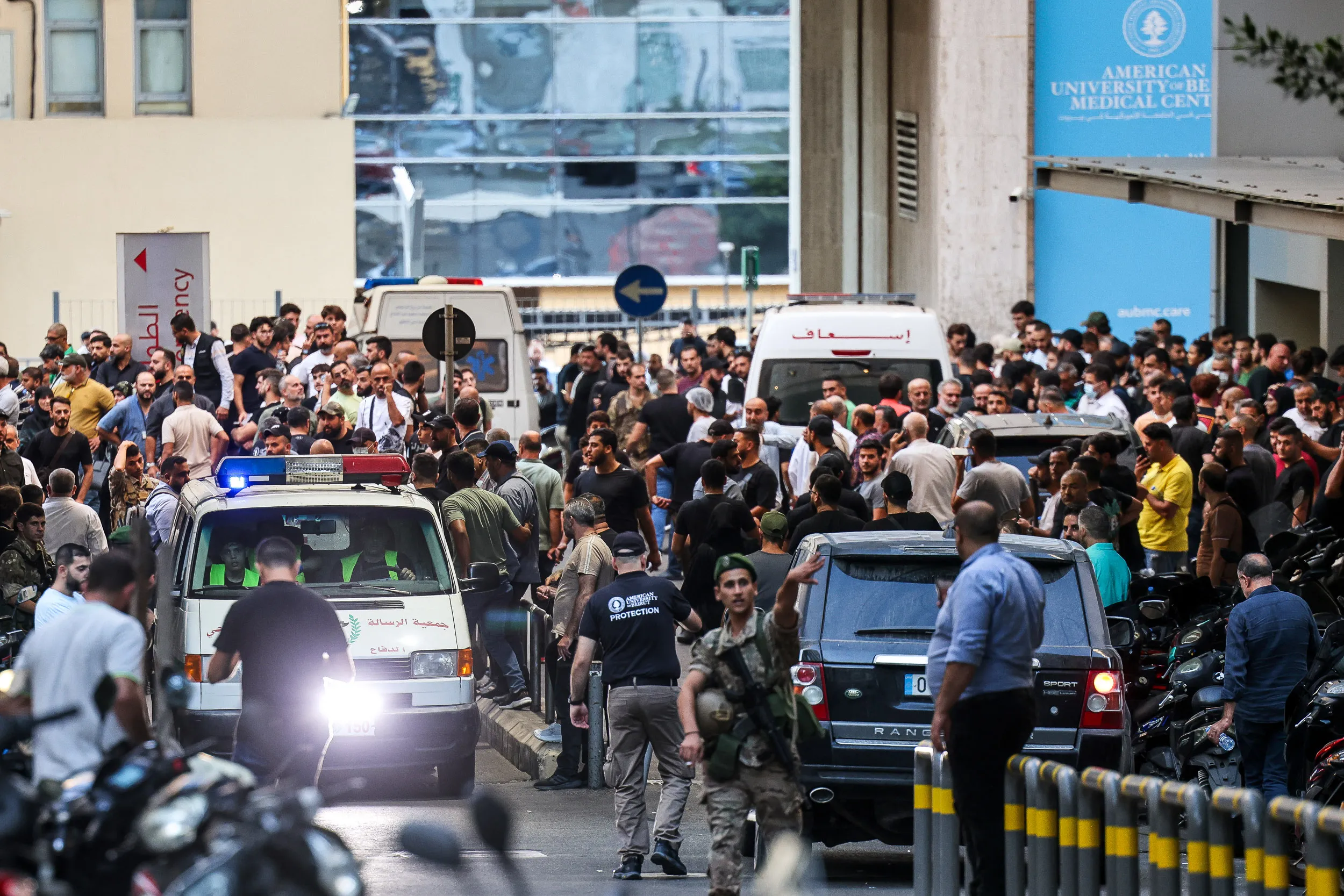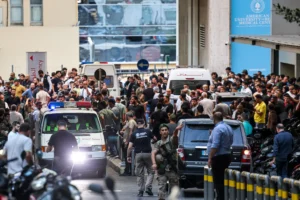

“Explosive Intelligence: The Day Hezbollah’s Communication Network Was Compromised”
- Israel’s Mossad Allegedly Planted Explosives in Hezbollah Pagers: On September 17, 2024, a series of coordinated explosions occurred across Lebanon, resulting in the deaths of at least nine individuals and injuring around 3,000 others. Reports indicate that these detonations were linked to a sophisticated operation by Israel’s intelligence agency, Mossad, which allegedly inserted explosives into pagers used by members of Hezbollah.
- Details of the Operation: According to various sources, including Lebanese security officials and international media, the explosives were concealed within approximately 5,000 pagers manufactured in Taiwan. The devices had been ordered by Hezbollah months prior and were intended to provide secure communication for the group, which has historically avoided mobile phones due to concerns about surveillance. The explosives were reportedly detonated remotely upon receiving a specific message.
- Explosive Composition and Mechanism: It is believed that around three grams of explosives, possibly Pentaerythritol Tetranitrate (PETN), were planted near the battery of each pager. This strategic placement allowed for the devices to remain undetected until the moment of detonation. The synchronized explosions occurred just after 3:30 PM local time, leading to chaos and overwhelming medical facilities in Lebanon.
- Hezbollah’s Response: In the aftermath of the explosions, Hezbollah has vowed to retaliate against Israel, labeling the incident as a “criminal Israeli aggression.” The Lebanese government has also condemned the attacks, calling for accountability. The explosions have heightened tensions in an already volatile region, with fears of escalating conflict between Israel and Hezbollah.
- Context and Implications: This incident marks a significant escalation in the ongoing hostilities between Israel and Hezbollah. Historically, both parties have engaged in tit-for-tat attacks; however, this operation showcases a new level of sophistication in Israeli intelligence tactics. Experts suggest that such actions could provoke further military responses from Hezbollah and potentially lead to broader regional conflict.
- International Reactions: Following the explosions, calls for restraint have emerged from various international bodies, including the United States and the United Nations. Observers are closely monitoring the situation as it develops, given its potential implications for security in Lebanon and Israel.
- Conclusion: The use of pagers as a tool for covert communication by Hezbollah has backfired dramatically with this incident. As investigations continue into how these devices were compromised, it remains to be seen how Hezbollah will respond and what this means for future Israeli-Hezbollah relations. The ramifications of this attack could resonate throughout the region, impacting not only military strategies but also diplomatic efforts aimed at de-escalation.

How did Hezbollah discover the pagers were compromised
Hezbollah discovered that the pagers were compromised through a combination of operational mishaps and internal investigations following the explosions on September 17, 2024. Here are the key details regarding how they came to this realization:
Discovery of Compromised Pagers
- Initial Use Without Suspicion: The pagers, which Hezbollah had purchased from a Taiwanese company, were used for nearly five months without raising any alarms. During this period, they became integral to Hezbollah’s communication network, as the group had shifted to pagers to avoid detection by Israeli intelligence agencies that often monitor mobile phone communications.
- Explosions Trigger Awareness: The turning point came when the pagers exploded almost simultaneously across Lebanon and parts of Syria, leading to significant casualties. This unprecedented event prompted an immediate investigation into the cause of the explosions.
- Internal Investigations: Following the blasts, Hezbollah operatives began inspecting the remaining undetonated pagers. Reports indicated that between 3 to 5 grams of highly explosive material had been embedded within the circuitry of these devices. The explosives were likely concealed near the battery, making them difficult to detect prior to detonation.
- Error Message Trigger: Analysts suggested that the explosions were triggered by an error message sent to all devices, indicating a remote detonation mechanism. This revelation highlighted a significant breach in Hezbollah’s security protocols and raised questions about their reliance on what they believed to be secure communication methods.
- Suspicion Among Operatives: Prior to the explosions, there were reports that some Hezbollah operatives had begun expressing concerns about the new model of pagers they were using. This suspicion may have prompted Israel to act quickly before Hezbollah could fully investigate or counteract the perceived threat posed by these devices.
- Response and Consequences: In light of these findings, Hezbollah has vowed to retaliate against Israel for what they termed “criminal aggression.” The incident has forced the group to reevaluate its communication strategies and security measures moving forward.
This sophisticated operation underscores not only the vulnerabilities within Hezbollah’s operational security but also highlights Israel’s advanced intelligence capabilities in infiltrating and compromising enemy communication networks.

What was the initial reaction of Hezbollah members when the pagers exploded
When the pagers belonging to Hezbollah members started exploding across Lebanon on September 17, 2024, it caused widespread panic and chaos among the group’s ranks:
Initial Reactions of Hezbollah Members
- Confusion and Disbelief: Many Hezbollah operatives were caught off guard when their pagers suddenly exploded, often in their pockets or hands. Eyewitnesses reported seeing smoke billowing from people’s pockets, followed by small blasts resembling fireworks.
- Attempts to Dispose of Pagers: Some Hezbollah members felt their pagers heating up and quickly disposed of them before they exploded, according to reports. This suggests they realized something was wrong with the devices.
- Casualties Among Hezbollah Leadership: The Iranian ambassador to Lebanon lost an eye when a pager he was carrying exploded.Two sons of Hezbollah parliament members were among the nine killed in the attack.
- Chaos and Panic: The explosions caused widespread panic, with hospitals across Lebanon quickly becoming overwhelmed by the influx of casualties, estimated to be over 2,800 people. Scenes of chaos were reported as wounded fighters arrived at medical facilities.
Hezbollah’s Official Response
- Blaming Israel: Hezbollah immediately accused Israel’s Mossad intelligence agency of orchestrating the attack on its communication devices.The group vowed to retaliate against this “criminal aggression”
- Reevaluating Security Protocols: The incident has forced Hezbollah to reevaluate its communication strategies and security measures moving forward, as it grapples with this major breach of its operational security.
The pager explosions represented a significant blow to Hezbollah’s reputation and confidence in its ability to maintain secure communications. The group’s initial reactions were marked by confusion, panic, and a resolve to hold Israel accountable for this unprecedented attack on its infrastructure and personnel.

Discover more from
Subscribe to get the latest posts sent to your email.








